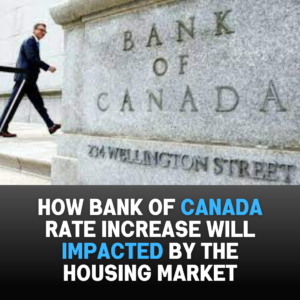
The Bank of Canada plays a crucial role in shaping the Canadian economy, and one of its key tools is adjusting interest rates. When the Bank of Canada raises interest rates, it has a direct impact on various sectors, including the housing market. In this blog post of ontario centrist party, we will explore how another Bank of Canada rate hike could affect the housing market.
Impact on Mortgage Rates
One of the most immediate effects of a Bank of Canada rate hike is an increase in mortgage rates. As the central bank raises its benchmark interest rate, commercial banks and lenders typically follow suit by increasing their prime lending rates. This, in turn, leads to higher borrowing costs for homebuyers. As mortgage rates rise, it becomes more expensive to finance a home purchase, potentially reducing the affordability of homes for prospective buyers.
Affordability and Housing Demand
Higher mortgage rates can have a significant impact on housing affordability. As borrowing costs increase, some potential homebuyers may find it more challenging to qualify for a mortgage or afford the monthly payments. This can lead to a decrease in housing demand, particularly among first-time buyers or those with tighter budgets. A decline in demand could put downward pressure on housing prices, as sellers may need to adjust their expectations to attract buyers.
Existing Homeowners and Variable Rate Mortgages
For existing homeowners with variable rate mortgages, a Bank of Canada rate hike means higher monthly mortgage payments. Variable rate mortgages are directly tied to the prime lending rate, so any increase in the rate will result in higher interest charges. This can put financial strain on homeowners who may need to adjust their budgets to accommodate the higher costs. Some homeowners may consider refinancing their mortgages to lock in a fixed rate before further rate hikes occur.
Market Stability and Investor Sentiment
A Bank of Canada rate hike can also impact investor sentiment and market stability. Real estate is a significant component of the Canadian economy, and any changes in the housing market can have broader implications. If the housing market experiences a significant slowdown due to higher interest rates, it could affect consumer confidence and overall economic growth. Investors may become more cautious, leading to a potential slowdown in real estate investment and development.
Regional Variations
It’s important to note that the impact of a Bank of Canada rate hike on the housing market can vary across different regions. Housing markets in major cities like Toronto and Vancouver may be more sensitive to interest rate changes due to higher home prices and higher levels of household debt. On the other hand, smaller or more affordable markets may be less affected by rate hikes.
Conclusion
Another Bank of Canada rate hike can have a significant impact on the housing market. Higher mortgage rates can reduce affordability and housing demand, potentially leading to a slowdown in price growth. Existing homeowners with variable rate mortgages may face higher monthly payments, while investor sentiment and market stability could be influenced by changes in the housing market. It’s essential for homebuyers, homeowners, and investors to stay informed about the Bank of Canada’s decisions and their potential implications for the housing market.We, as the Ontario centrist party, believe governance should be transparent and easy to understand. Governance should be dictated by the people and work for the people. It should strive to ensure all – no matter the ethnicity, origin, race or color have a voice, which is heard and acted upon.